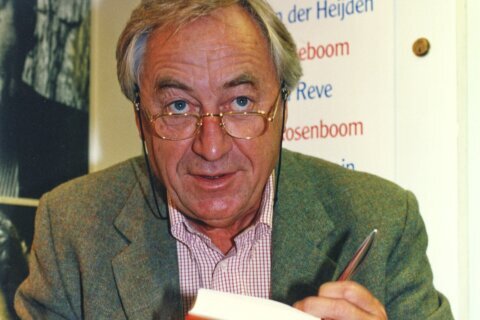Hear our full chat on my podcast “Beyond the Fame with Jason Fraley.”
He evolved from the eldest son of Bob Marley into an acclaimed reggae titan in his own right.
The prolific Ziggy Marley performs live at Wolf Trap in Vienna, Virginia, this Saturday and Sunday on a bill that also includes Mavis Staples and Trombone Shorty with the Orleans Avenue band.
“Mavis, she’s a legend and an artist that I respect and love, I have been listening to her for years, so she’s a big inspiration,” Marley told WTOP. “Trombone Shorty, just the energy and the vibe that he brings to the music. I love both of them and respect both of them a lot.”
Last year, Ziggy played Wolf Trap with his brother Stephen for a special tribute to their father’s music, but this weekend, the set list will mostly be Ziggy’s originals with a few of his dad’s hits sprinkled in.
“We do music with a purpose,” Marley said. “The lyrics are very important. We’re singing about freedom, we’re singing about rights, we’re singing about justice, we’re singing about revolution, we’re singing about nature, we’re singing about the environment, we’re singing about love. Love is my religion.”
Born in 1968 in Kingston, Jamaica, Ziggy famously grew up in Trench Town, but you might not know that he also spent time here in the “Delmarva” region, attending elementary school in Wilmington, Delaware.
“I went to school in Wilmington maybe a year, we didn’t stay long,” Marley said.
“I think my father and mother were trying to find some work to make some money to send us to school and stuff like that. We lived there with my grandmother, my father’s mother. It was the first time I saw snow, the first time I saw what Christmas was, so being in Delaware was a very life-changing experience for a young kid like me.”
He changed his name from David to “Ziggy” before David Bowie released his 1972 album “Ziggy Stardust.”
“My father just called me ‘Ziggy’ — in Jamaica, we have nicknames for everybody,” Marley said.
“It was before ‘Ziggy Stardust,’ the David Bowie thing. David Bowie and me talked about it before he passed away too, because he was asking me the same question and I told him the story and he was like, ‘Oh, OK.’ I get that question all the time, but in Jamaica in those days, a ‘ziggy’ was a small [marijuana] joint.”
In 1979, 11-year-old Ziggy teamed up with his talented siblings to form The Melody Makers, recording their breakthrough song “Children Playing in the Streets,” written by their iconic father.
“We just grew up in that naturally,” Marley said.
“It wasn’t something like, ‘Let’s do it,’ it just happened because we grew up around it. My father wrote that first song, ‘Children Playing in the Streets,’ he wrote that and played on it too. We didn’t think about it a lot in those days. The idea of the limelight is more of an American concept than a Jamaican thing. In Jamaica, you are who you are, whether you’re famous or not, whether you’re rich or poor, you just are who you are.”
When his dad tragically died at age 36 in 1981, Ziggy began filling in with his father’s band, The Wailers, while his sibling group The Melody Makers earned their first Grammy nod for the album “Play the Game Right” (1985).
They won for “Conscious Party” (1988) and “One Bright Day” (1989), were nominated for “Jahmekya” (1991), “Joy and Blues” (1993) and “Free Like We Want 2 Be” (1995), and then won again for “Fallen is Babylon” (1997).
“It’s cool that we got the Grammys and stuff, but we don’t talk about it that way,” Marley said.
“In terms of our mindset, I grew up in those years searching for spiritual enlightening, so awards and material things were not something that we thought of as, ‘wow, that solidifies us or makes us mean more.’ That’s just not where my mind was or where I wanted to be. … I am who I am. No awards or adulation can make me be greater than who I am already.”
At the turn of the 21st century, Marley ventured off solo to release “Dragonfly” (2003), followed by a pair of Grammy-winning solo albums in “Love is My Religion” (2006) and “Family Time” (2009).
“That was a very significant time in my life moving from playing with my brothers and sisters into moving on my own,” Marley said.
“It was scary. … I decided to move out and left where my family was staying and came to L.A. … I think it was necessary for my growth as a man, as a person, as a human being to expose myself to people and places that I might not be comfortable with or in — and to search for my life as an individual.”
Though Marley said he doesn’t care about accolades, he was nominated for another Grammy for “Wild and Free” (2011) before winning again for “Ziggy Marley in Concert” (2013) and “Fly Rasta” (2014). The latter featured the opening track “I Don’t Wanna Live on Mars,” which was a dire warning about the pollution of planet Earth.
“‘Fly Rasta,’ I think I’ve been writing that song for 20 years and I don’t think it’s finished yet, I think I still have more to write from that song,” Marley said.
“When I started to explore my spirituality, my identity, my philosophy, the Rasta culture, which is what I grew up in, was a foundation for me to build on. It was important to give that foundation some love and to remember where I was coming from and what started my journey.”
His most recent Grammy win came for the self-titled album “Ziggy Marley” (2016), followed by the Grammy-nominated album “Rebellion Rises” (2018), but he never rests on those laurels.
During the pandemic, Marley released “More Family Time” (2020) featuring star-studded collaborations with Alanis Morissette, Busta Rhymes, Sheryl Crow, Lisa Loeb, Tom Morello and Ben Harper. Fittingly, a portion of the proceeds from the album went to charity.
“A lot of my songs are very relevant to what’s going on in the world today,” Marley said. “We’re coming with messages for the people in music. It’s important that while we’re having a good time, we’re also becoming conscious mentally and being inspired to take action to make the country and the world a better place.”
Hear our full chat on my podcast “Beyond the Fame with Jason Fraley.”








